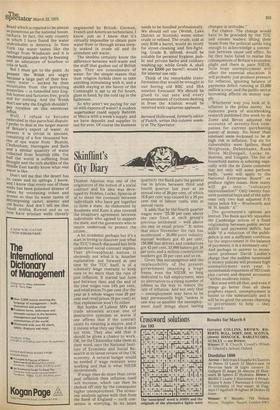Skinflint's City Diary
Thomas Aquinas was one of the originators of the notion of a social contract and his idea was developed by Hobbes, Locke, Spinoza et al to mean the covenant between individuals who have got together to form a state. As elaborated by Rousseau and Kant it also covered the imaginary agreement between individuals who agreed to support the state, and the governors who in return undertook to protect the citizen.
A bit academic perhaps but it's a start in trying to discover just what the TUC's much discussed but little understood social contract implies. That philosophical notion is obviously not what it is. Another explanation. put forward at one time by the TUC itself, is of a voluntary wage restraint to keep rises to no more than the rate of past inflation. It started last June and between then and the end of the year wages rose I43A per cent, and retail prices 7% per cent (for the year as a whole wages rose 29 per cent and retail prices 19 per cent) so that explanation won't fit either.
But hordes of Labour MPs and trade unionists accuse one of destructive cynicism or worse if one affirms that if the contract exists its meaning is elusive, and if it means what they say then it does not exist. They also add that it should be given a chance to work. OK, let the Chancellor take them at their word, says the National Institute of Economic and Social Research in its latest review of the UK economy. A netural budget would be needed if wage restraint were working and that is what NIESR recommends.
If wage rises do more than cover past inflation then inflation itself will increase, which can then be choked off only by the consequent higher unemployment. The economic analysis agrees with that from the Bank of England — such consensus is worrying. In its latest quarterly the Bank puts the general rise in prices between third and fourth quarter last year at an annual rate of 20 per cent, of which 16.6 per cent was caused by a 28 per cent rise in labour costs, also at annual rates.
It adds that by the fourth quarter wages were "25-30 per cent above the rate fixed at each group's previous settlement — well above the rise in retail prices." It notes that since November the rate has accelerated — 20,000 paint industry manual workers got 43 per cent, 150,000 bus drivers and conductors got 42 per cent, 33,000 bakers got 38 per cent, and a million constructiOn workers got 35 per cent and so on.
Given this intransigence and the implausibility of the present government imposing a wage freeze, even the NIESR, so long dedicated to full employment, sees no alternative to a rising number of jobless as the way to reduce the rate of inflation. And not only that — unemployment may have to be kept permanently high "unless in one way or another the unemployment itself brings about lasting changes in attitudes."
Fat chance. The change would have to be preceded by the TUC and unions leaders lifting their heads from the political sands long enough to acknowledge a connection between cause and effect. So far they have failed to realise the consequences of Britain's economic plight and there is, pace NIESR, little hope unemployment will effect the essential education. It will probably just produce pressure for reflation, ignoring balance of payments deficit running at £3,000 million a year, and the public sector borrowing effects on money supply
Whichever way you look at it, inflation is the prime enemy. An elaborate piece of stockbroking research published this week by de Zoete and Bevan adjusted the accounts of seventy-five companies for current purchasing power of money. No fewer than nineteen were reckoned to be at high risk in inflation. Top six for Vulnerability were Spillers, Head Wrightson, Debenhams, Rank Hovis McDougall, Lucas Industries, and Unigate. The list of household names is sobering especially with the de Zoete comment that not only will some perform badly, "some will apply to the National Enterprise Board" or produce rights issues. How many will go into "voluntary nationalisation?" Only twenty-four were potential buys and of the safer ones only two had adjusted P/E ratios below 9.9 — Woolworth and W. H. Smith "A".
The government's options are limited. The Bank quickly squashes the Cambridge notion of a fixed relationship between public sector deficit and payments deficit, but adds "if a reduction of the public deficit is not a sufficient condition for the improvement in the balance of payments, it is a necessary one." And perhaps in answer to monetarist professor David Laidler's charge that the sudden turnround in money policies will produce high unemployment next year, it recommends expansion of M3 (cash plus current and deposit accounts) "within moderate limits."
' But even with all that, and even if things go better than all these prophets expect, unemployment is bound to rise substantially and it will be no good the unions chanting to government to help — they caused it.


































 Previous page
Previous page